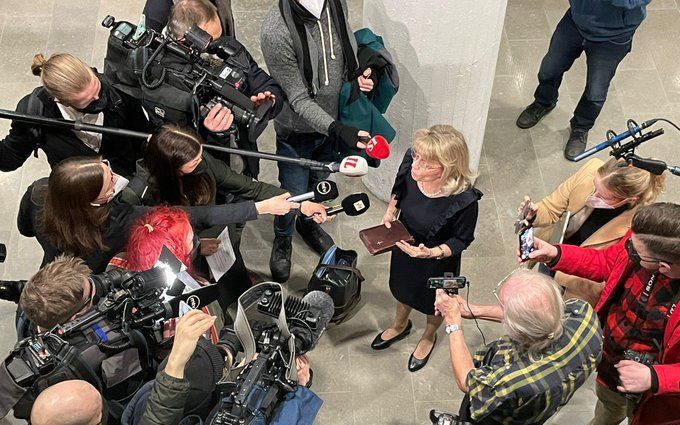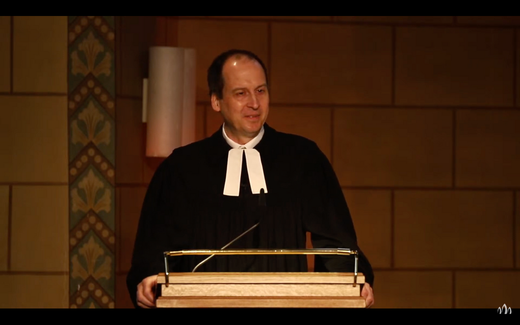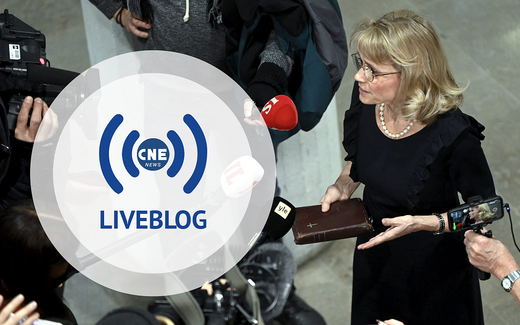Just before decision on Räsänen: how is it with freedom of religion?
26-03-2022
European Union
Dr C. S. L. Janse, RD

Päivi Räsänen surrounded by media during her trial in January 2022 in Helsinki, Finland. Photo ADF International
European Union
In the coming week, the Finnish judge will decide the Räsänen case. The consequences can be very far-reaching. But in what state is the freedom of religion at this moment? Dr Janse offers a perspective from the Netherlands.
Is our government increasingly revealing itself as an anti-Christian force? Undeniably, we still have a great deal of freedom to speak and act according to the Bible. But it is equally clear that this freedom is gradually diminishing. Not only in the Netherlands but all over the world.
Therefore, it is very important to monitor these developments closely and recognise the dangers. However, we have to keep an eye on the proportions. The situation in the Western world is fundamentally different than in Muslim countries or China, not to mention North Korea.
In Germany, we have the Latzel case; in Finland, the Räsänen case and in the Netherlands, there may be a lawsuit against Rev. Kort. All three cases are related to homosexuality. That's no coincidence. After all, on this point, the Bible clashes head-on with contemporary morality. The question arises whether specific Bible texts condemning homosexual behaviour will soon no longer be allowed to be quoted in public, but at most at home and within the own church congregation.
Individual law
Now, religious freedom is a broad concept. This varies from personal freedom of conscience to social functioning. The latter concerns, among other things, the freedom to live according to your faith in your own organisations and to be able to apply the norms of your faith there.
During the pillarisation in Holland, that freedom was ample. Today, the social freedom of religion is clearly under pressure. Especially when it comes to homosexuality, just think of the fuss around the Gomarus college (a Dutch Reformed school that came under national attention after the news was released that the school forced its personnel to indicate colleagues and pupils in a homosexual relationship, ed.). Previously, the Dutch Reformed SGP party was forced to admit women to its candidate lists. Religious freedom is nowadays mainly seen as an individual right.
Furthermore, there was often more room for deviating views than deviant behaviour. You had to comply with all kinds of prohibitions regarding discrimination. However, there was still room to clarify that you completely disagreed with them based on your religious conviction.
However, it is not about deeds in the three cases mentioned earlier. It is about words, about public statements. These would be hurtful and insulting and would have given the other party a feeling of insecurity. But suppose such statements based on the Bible about homosexuality are no longer allowed. In that case, only strict freedom of conscience will remain.
Then, you can still object to homosexuality in your mind and possibly talk about it with kindred spirits, but no further. If you raise your children with those convictions, it could become a problem. That is often called indoctrination.
How does this substantial restriction relate to the freedom of expression, which is highly regarded in our society and broadly interpreted? On the one hand (usually on the wrong side), a lot is possible; on the other hand, less and less is possible. Even if the Bible is at stake and you can point out that it concerns widely shared views not so long ago.
This has to do with the fact that homosexual relationships are entirely accepted in our society. People are proud that all kinds of prejudices about this have now been broken. Woe to anyone who dares to oppose it. This also applies to the more recent gender debate. The fact that God created man as male and female is considered completely outdated.
LGBT people are considered a vulnerable minority that is entitled to protection. The woke movement stands up for the weak and oppressed, at least insofar as this fits within its progressive views. Opposition to abortion is not one of them. The Dutch initiative proposal to ban conversion therapy is.
For example, it is felt that a vulnerable minority in the public space should be protected against aggressive statements. Also, against critical remarks that are experienced as aggressive. Because the emotional component of human existence is strongly emphasised today, the experienced reality is stressed. If people experience something as unsafe and threatening, that weighs heavily. Then action must be taken.
Liberation and Compassion
It will be apparent that you cannot interpret these confrontations in terms of Christians versus secular society. Among those who call themselves Christians, many have long since given up their traditional views on homosexuality and have traded binary thinking (thinking in terms of man and woman) for a more varied view of humanity. This is undoubtedly the case in the Western world. In their view, the Bible primarily offers a message of liberation and compassion. Anything that does not correspond to this is considered culture-bound. You can no longer afford that at this time.
You also see this in the broader Reformed groups in society. In the Evangelical world, there are also sliding panels. At the time, the Christian Democratic CDA party voted overwhelmingly against the introduction of same-sex marriage back in 2000. But now, there are quite a few within the more radical ChristianUnion who favour gay marriage.
The admission of women to ecclesiastical offices is also the fruit of a new hermeneutics, a different reading of the Bible. The Roman Catholic Church still maintains its traditional position on this matter, although the church base thinks otherwise. This also applies to homosexuality.
As long as the large Roman Catholic Church rejects the ordination of women, the small Protestant churches that do not have female ministers will not be left alone. But suppose Rome turns the direction. In that case, the social pressure on the orthodox-Protestant churches that do not go along with it will increase. Excluding women as office-bearers as the purest form of discrimination! Besides, all thinking in terms of men and women is considered obsolete.
The people in our time clearly do not want to know about God and His commandments. That was not much different in the past, but it is unmistakable that dark clouds are now gathering. More than ever, therefore, the church must be preserved by God. But through all afflictions, He will surely do so.
An earlier version of the article in Dutch was published in Reformatorisch Dagblad on February 26th 2022.
Related Articles





